RECOIL OFFGRID Gear Pocket Preps: Hawkbill Blades
In This Article
One of the more interesting blade styles is the Hawkbill blade. They have an old history and are used in everything from gardening to combat and personal protection. Of course, one of the more famous designs is the karambit. This time out we avoided ringed karambits, as they’re in a category all their own. Steve Tarani and others who specialize in karambits and the arts in which they’re used maintain that it’s the curved blade, even more so than the ring, that makes a knife a karambit.
Not popular as a chopper like a machete or Kukri, the Hawkbill blade excels at slicing and cutting. These knives have a pointed tip but typically aren’t used for stabbing like a dagger. Hawkbill knife blades in the West were most commonly fixed blades and slipjoints used for gardening and utilitarian chores such as cutting carpet or linoleum. The design would evolve over time, although we chose an example of the utility type knife as well.
Aside from self-defense or pruning, the Hawkbill excels at cutting rope, webbing, netting and line because the curved tip holds the object you’re cutting against the sharp edge. If there’s a drawback to these types of knives, it may be maintaining the edge on a curved blade. Whetstones and straight sharpening devices won’t work here. You can either send them back to the maker or manufacturer, visit or send to a professional knife sharpener, or invest in a round-shaped sharpening stone or rod. It’s a natural shape in that it often follows the same shape as the claws of raptors, big cats, bears, or other animals and that may be part of its inspiration.
The Hawkbill surely runs the gamut from minuscule to extra-large and from basic utility to self-defense. It may not be favored by everyone, but they definitely fill a niche for most knife users.
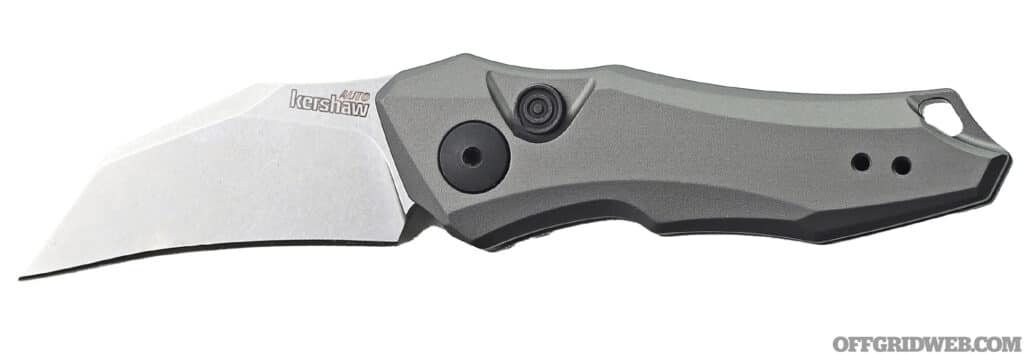
Launch 10
Kershaw Knives is mostly associated with their speed-assisted knives, but they’ve been making autos for almost as long. The Launch 10, nicknamed “the Claw” by employees at Kershaw, is their take on the Hawkbill design. This is a sub-2-inch blade auto, which should make it legal in most areas, like California. It definitely packs a lot of cutting power into its small size and a Hawkbill blade makes complete sense for that reason.
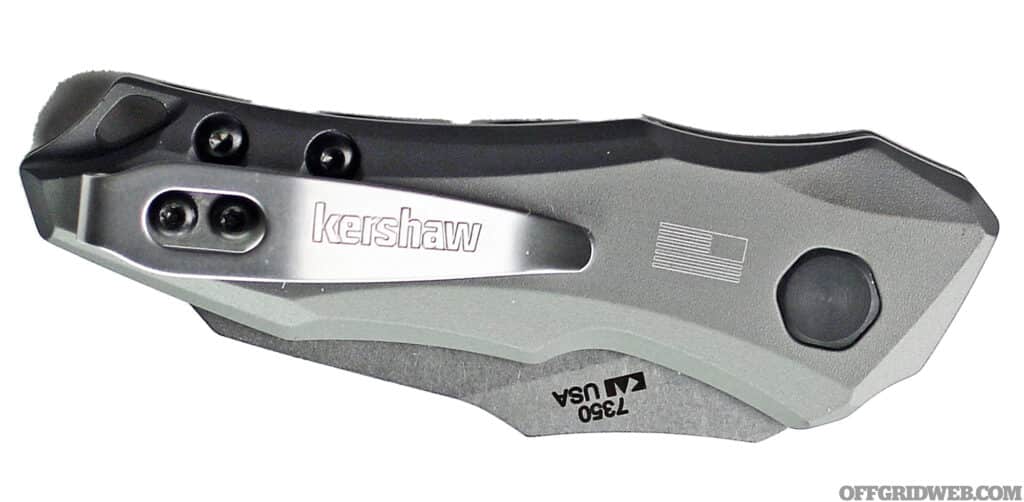
Pros:
The blade is made from CPM154 — that means it’s tough, razor sharp, rust resistant, and sports an easily maintainable edge.
Very small and handy, this knife performed well as a cutter, and the factory grind was just about perfect.
Fires like a rocket every time like all autos should function
Cons:
The pocket clip is a bit too tight from the factory for fast access.
Although legal in California, it can be hard to find in some areas.
Overall length: 5.2 inches
Blade Length: 1.9 inches
Weight: 1.8 ounces
Blade Material: CPM154
Price: $148
URL: kershaw.kaiusa.com
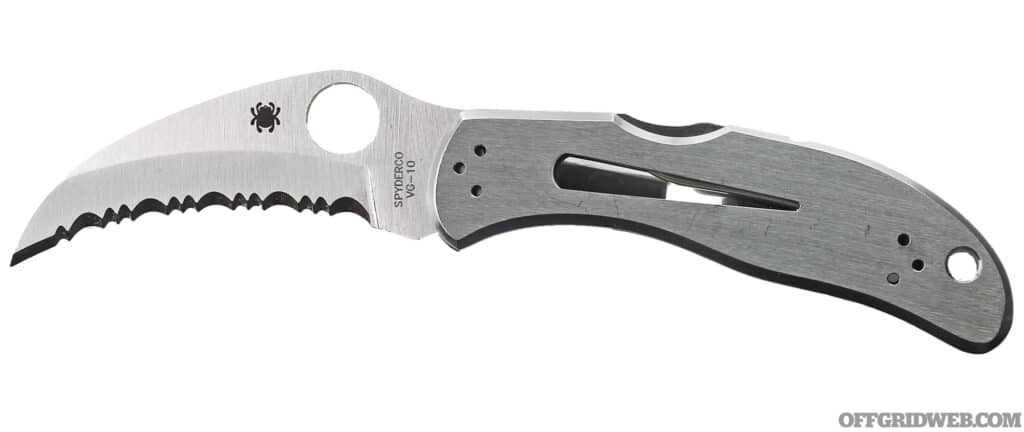
Harpy
Spyderco’s Harpy may have been one of the first of the modern tactical Hawkbill blades put out by a production knife company. If you know the history of the company, this design pairs a classic knife style with Spyderco’s patented serrations, and it’s perfect for cutting rope, webbing, fishing nets, etc., particularly in a wet or maritime environment. Spyderco designed it for the commercial fishing industry. A hole in the handle helps the blade dry while it’s closed. One of the company’s most effective and influential designs, models such as the Merlin, Tasman Salt, and others followed in its footsteps.
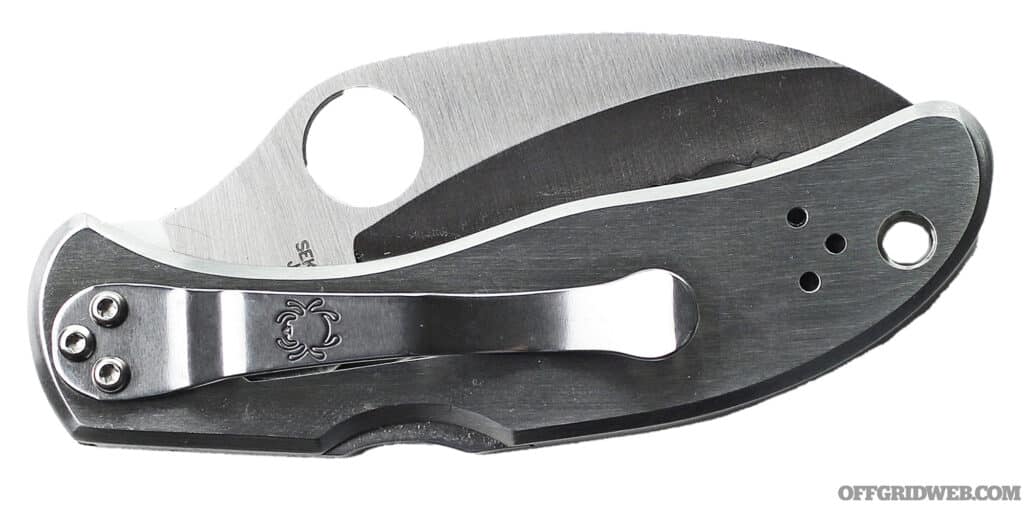
Pros:
VG10 steel is easy to maintain, wear resistant, and rust resistant.
Lock-back mechanism offers strength and security.
The clip can be positioned tip-up, tip-down, left-handed, or right-handed.
Cons:
Can be hard to obtain due to demand
The stainless handle can get slick under wet conditions; some texturing would be welcome on this one.
Overall length: 6.5 inches
Blade Length: 2.75 inches
Weight: 3.9 ounces
Blade Material: VG10
Price: $188
URL: spyderco.com
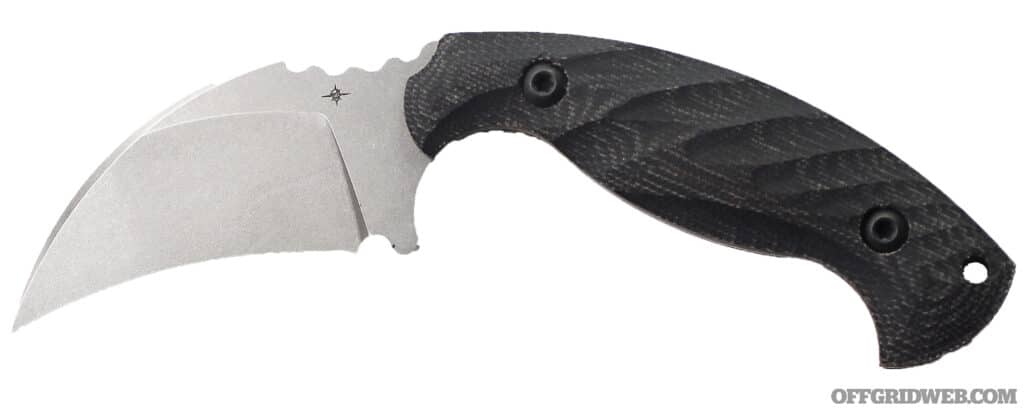
Karsumba
Toor Knives is one of those companies that constantly surprises me with the quality of their offerings. The Karsumba is their take on the Karambit without the distinctive ring to make it more concealable. The Micarta handles offer a no-slip grip, and the look and feel of the FlexTech Kydex is nothing short of amazing. This is one of those knives that once you pick it up, you don’t want to put it down.
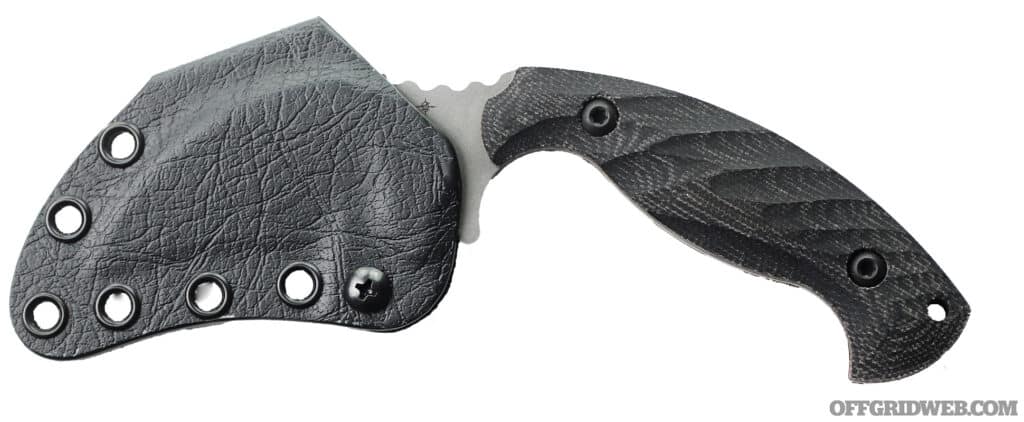
Pros:
Very comfortable in the hand, particularly in the reverse grip.
The blade is made from CPM 154; it’s tough, razor sharp, rust resistant, and sports an easily maintainable edge.
Although it’s obviously intended for self-defense, it performs all tasks well.
Cons:
Availability can be an issue. Toor Knives tend to sell out quickly once they’re in stock.
Mounting it on the belt for ideal placement and deployment took a bit of adjusting. I like how makers and manufacturers give you the options, but sometimes we need suggestions, too.
Overall length: 6.75 inches
Blade Length: 2.5 inches
Weight: 6.5 ounces
Blade Material: CPM154
Price: $250
URL: toorknives.com

Hawkbill
Böker USA is the American division of Böker Knives who has been making knives, swords, and hardware since the 18th century. The Hawkbill knife hearkens back to an older time period when the average pocketknife was the slip joint and the average Hawkbill knife was more of a utilitarian knife as opposed to a fighting blade. The jigged bone handles with stainless steel bolsters, shield embedded in the scales, slip joint, and a nail nick opener remind one more of the knives used in scouting. The hollow-ground blade is 440C and came decently sharpened from the factory.
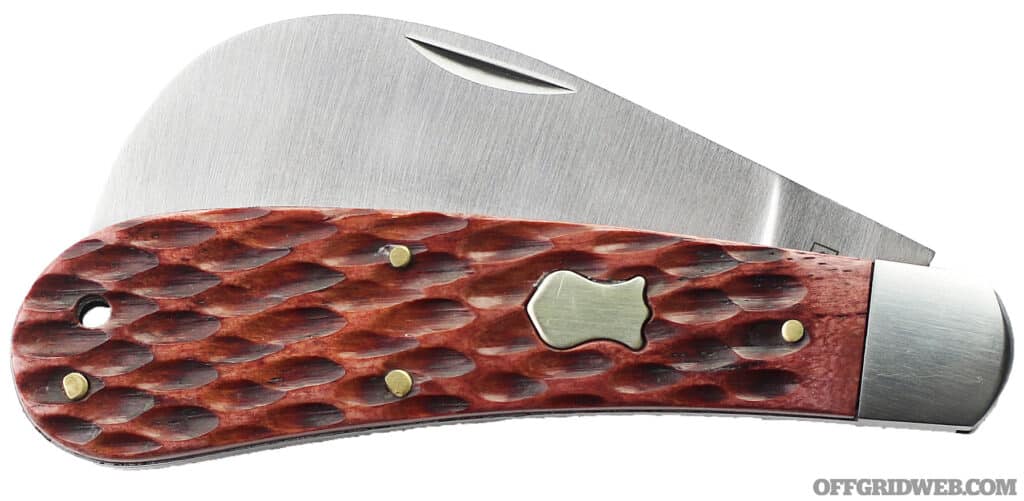
Pros:
Very light and easy to carry in the pocket
A good starter knife for a young person who needs to learn knife safety by two-handed opening.
440C is a great steel that’s easy to sharpen and rust resistant. At one time it seemed to be the default steel for pocketknives.
Cons:
Slipjoint knives do not lock, so use care with hard-use-type tasks.
Some modern users may not like the lack of a clip. This just drops in the pocket or fits in a belt sheath.
Overall length: 7 inches
Blade Length: 3 inches
Weight: 2.75 ounces
Blade Material: 440C
Price: $37
URL: bokerusa.com

Elvia
Elvia is a knife design from the mind of Ed Calderon. You may have read his writing in the pages of this magazine or his online posting as “Ed’s Manifesto.” It’s based on the type of knife his mother used to carry; she could use it as a kitchen knife or as a fighting blade to protect her family in Mexico. A number of custom knife makers have produced the design on behalf of Calderon, but Emerson’s may be the only factory take on the knife. Emerson himself has joked about starting a knife company just to satisfy the demand for this model. It’s advised to take a class on the use of this knife with Calderon as it behaves a little differently than most folders.
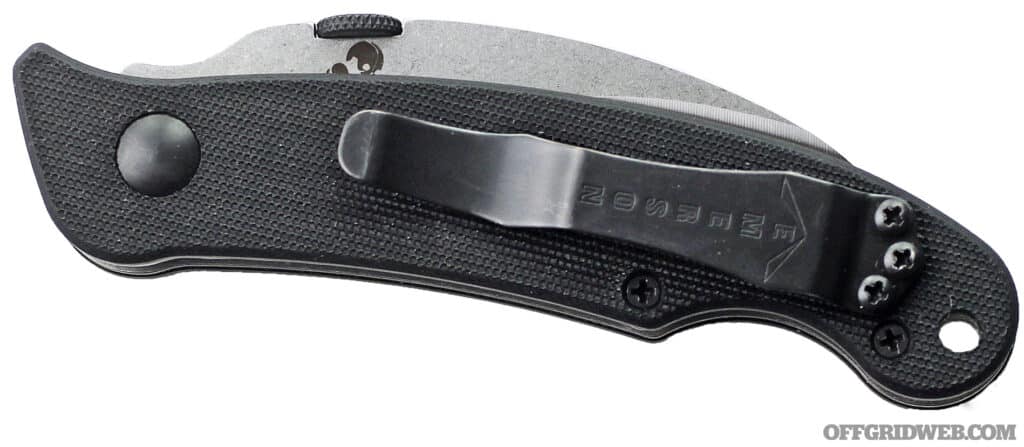
Pros:
154CM steel is razor sharp, rust resistant, and sports an easily maintainable edge.
Excels at cutting and slicing, even in the kitchen
Strong titanium liner lock
Cons:
If you can’t wait for Emerson Knives, the secondary market will have a serious bite regarding price.
It’s only tapped for clip use for right-handed users. Emerson can tap the other scale for an up-charge.
Overall length: 7.2 inches
Blade Length: 2.7 inches
Weight: 4 ounces
Blade Material: 154CM
Price: $279
URL: emersonknives.com
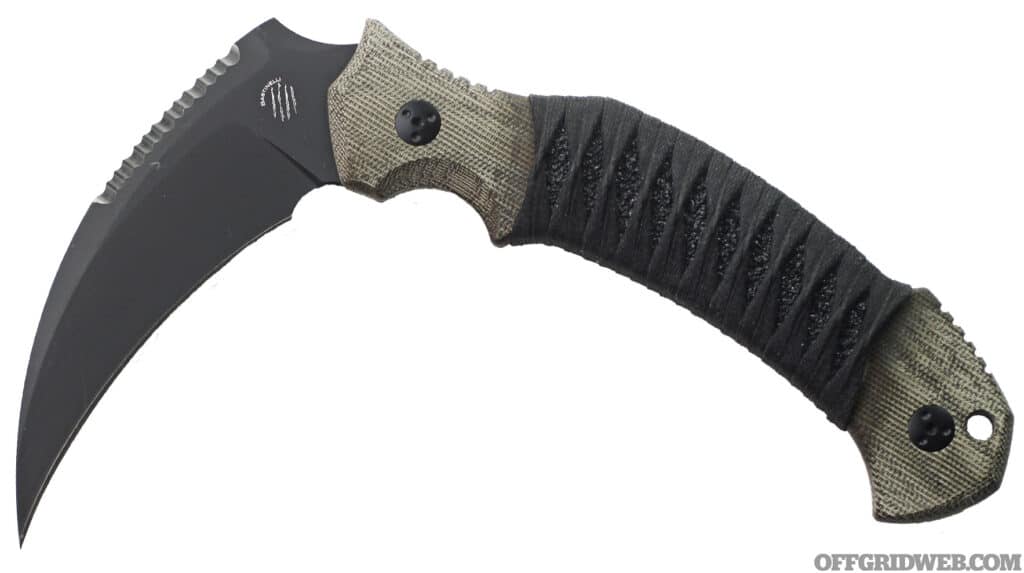
Grumpy
Some knives grab you when you first see them from across the room, and the Grumpy by Bastinelli Creations definitely fits that category. It might not fit what you think of when you think “knife,” but it certainly fits the bill in more ways than one. The Grumpy is more of a sickle, scythe, or Japanese Kama-inspired blade. I was a bit hesitant to include it, but had to once I realized its utility and saw a role for it on my pack for wilderness excursions. Made of M390 with Micarta handles, it rides in a Kydex sheath. This piece won the Best Factory Tactical award at the 2022 BLADE Show West.
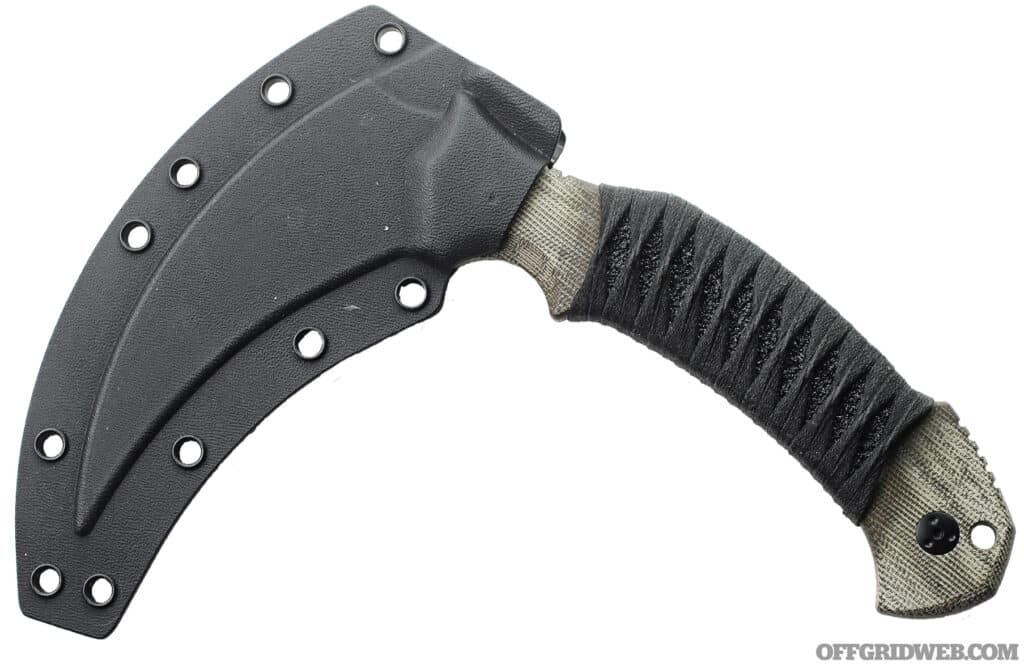
Pros:
M390 is a super steel that’s hard, exhibits great wear resistance, and probably the ultimate in corrosion resistance.
Razor sharp with a small, serrated section on top of the blade for added utility.
The rubber belt loop carry attachment works well for keeping the blade in an upright and ready-to-go position while remaining secure.
Cons:
May be large for concealment in urban environments
You may need to carry another knife for most EDC tasks.
Handle length: 6.61 inches
Blade Length: 5 inches
Weight: 5.89 ounces
Blade Material: M390
Price: $420
URL: bastinelliknives.com

Rastor
Reese Weiland is a custom knifemaker from Florida known for his iconic Hawkbill blades. The Rastor is his signature knife, and this same blade style is used on many of his other models. Sharp readers will notice it is the profile for the Microtech Hawk. This example has a Twist Damascus blade and blued Damascus bolsters with pre-ban elephant ivory scales and scrimshaw by Presidential Scrimshander Michael Hasbun. A blue sapphire is set in the thumb stud.
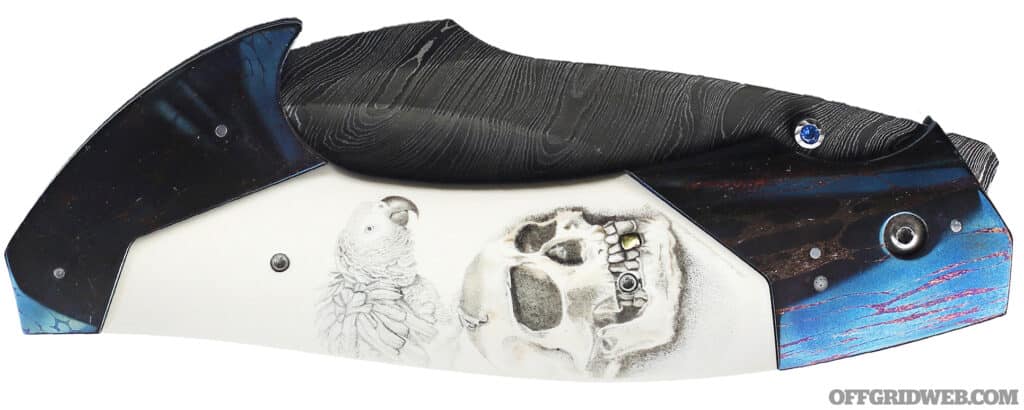
Pros:
This is a true custom knife, and this model can be ordered in a variety of steels and handle materials.
The hollow ground blade slices like a razor.
No bearings, etc., yet the knife opens and closes extremely smooth
Cons:
This particular example may be a bit too much to have on as an EDC knife. However, the knife can be had in a variety of different ways.
No pocket clip or sheath for carry unless you have a sheath made
There may be a long wait for one of these or a high aftermarket price.
Overall length: 10.25 inches

Blade Length: 4.25 inches
Weight: 12 ounces
Blade Material: Twist Damascus
Price: $750
URL: rwcustomknives.com
 STAY SAFE: Download a Free copy of the OFFGRID Outbreak Issue
STAY SAFE: Download a Free copy of the OFFGRID Outbreak Issue
No Comments